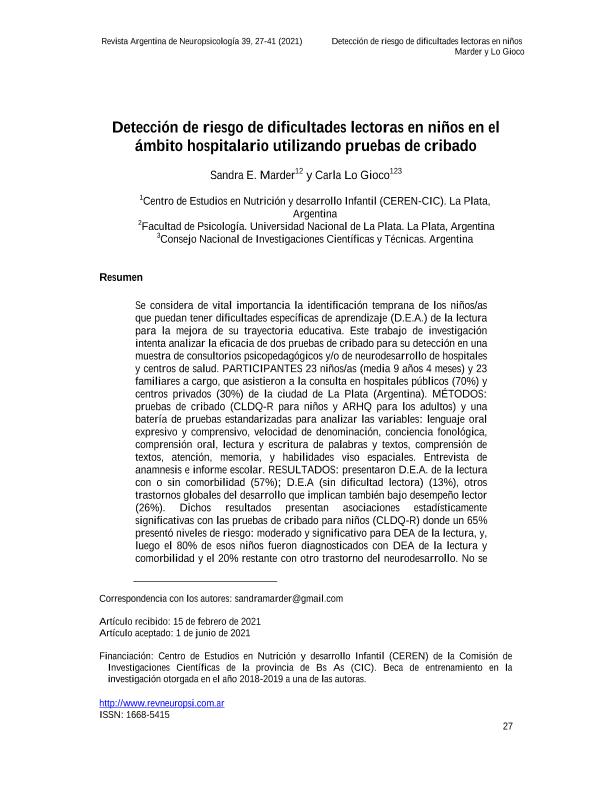Mostrar el registro sencillo del ítem
dc.contributor.author
Marder, Sandra Esther

dc.contributor.author
Lo Gioco, Carla

dc.date.available
2022-06-22T16:03:12Z
dc.date.issued
2021-06
dc.identifier.citation
Marder, Sandra Esther; Lo Gioco, Carla; Detección de riesgo de dificultades lectoras en niños en el ámbito hospitalario utilizando pruebas de cribado; Sociedad de Neuropsicología de Argentina; Revista Argentina de Neuropsicología; 39; 6-2021; 27-41
dc.identifier.issn
1668-5415
dc.identifier.uri
http://hdl.handle.net/11336/160222
dc.description.abstract
Se considera de vital importancia la identificación temprana de los niños/as que puedan tener dificultades específicas de aprendizaje (D.E.A.) de la lectura para la mejora de su trayectoria educativa. Este trabajo de investigación intenta analizar la eficacia de dos pruebas de cribado para su detección en una muestra de consultorios psicopedagógicos y/o de neurodesarrollo de hospitales y centros de salud. PARTICIPANTES 23 niños/as (media 9 años 4 meses) y 23 familiares a cargo, que asistieron a la consulta en hospitales públicos (70%) y centros privados (30%) de la ciudad de La Plata (Argentina). MÉTODOS: pruebas de cribado (CLDQ-R para niños y ARHQ para los adultos) y una batería de pruebas estandarizadas para analizar las variables: lenguaje oral expresivo y comprensivo, velocidad de denominación, conciencia fonológica, comprensión oral, lectura y escritura de palabras y textos, comprensión de textos, atención, memoria, y habilidades viso espaciales. Entrevista de anamnesis e informe escolar. RESULTADOS: presentaron D.E.A. de la lectura con o sin comorbilidad (57%); D.E.A (sin dificultad lectora) (13%), otros trastornos globales del desarrollo que implican también bajo desempeño lector (26%). Dichos resultados presentan asociaciones estadísticamente significativas con las pruebas de cribado para niños (CLDQ-R) donde un 65% presentó niveles de riesgo: moderado y significativo para DEA de la lectura, y, luego el 80% de esos niños fueron diagnosticados con DEA de la lectura y comorbilidad y el 20% restante con otro trastorno del neurodesarrollo. No se obtiene asociación estadística en el caso de la prueba de cribado de adultos. CONCLUSIÓN: Se plantea la conveniencia del uso de las pruebas de cribado en niños/as para el diagnóstico oportuno de dificultades de aprendizaje.
dc.description.abstract
Early identification of children who may have reading difficulties is of vital importance to improve their educational performance. This research work attempts to analyze the efficacy of two screening tests for their detection in a sample of psychopedagogical and / or neurodevelopmental clinics in hospitals and health centers. PARTICIPANTS: sample includes 23 children (M 9,4) and 23 parents, who attended consultation in public hospitals (70%) and private centers (30%) in and around the city of La Plata (Argentina). METHODS: screening tests (CLDQ-R for the children and ARHQ for adults), standardized tests (expressive and comprehensive language, naming speed, phonological awareness, listening and text comprehension, reading and writing of texts and words, reading comprehension, executive functions, attention, memory, and visuospatial skills) and school reports. RESULTS: presented learning disabilities in reading (R.D.L, dyslexia) with or without comorbidity (57% of the sample), RDL not dyslexia (13%), other global developmental disorders that result in poor reading performance (26%). In the screening tests, 65% of the children presented moderate to significant risk levels for reading learning disabilities, 80% of these children were later diagnosed with RDL dyslexia and comorbidity and the remaining 20% with another disorder of the neurodevelopment that also implies a lag in reading performance. These results show statistically significant associations with the screening tests for children. CONCLUSIONS: The convenience of using this screening tests for the timely diagnosis of learning difficulties in children is raised.
dc.format
application/pdf
dc.language.iso
spa
dc.publisher
Sociedad de Neuropsicología de Argentina
dc.rights
info:eu-repo/semantics/openAccess
dc.rights.uri
https://creativecommons.org/licenses/by-nc-sa/2.5/ar/
dc.subject
Pruebas de cribado
dc.subject
Lectura
dc.subject
DEA
dc.subject
Niños
dc.subject.classification
Psicología

dc.subject.classification
Psicología

dc.subject.classification
CIENCIAS SOCIALES

dc.title
Detección de riesgo de dificultades lectoras en niños en el ámbito hospitalario utilizando pruebas de cribado
dc.title
Detection of the risk of children's reading disabilities in the hospital using screening tests
dc.type
info:eu-repo/semantics/article
dc.type
info:ar-repo/semantics/artículo
dc.type
info:eu-repo/semantics/publishedVersion
dc.date.updated
2022-06-13T14:25:55Z
dc.journal.number
39
dc.journal.pagination
27-41
dc.journal.pais
Argentina

dc.journal.ciudad
Ciudad Autónoma de Buenos Aires
dc.description.fil
Fil: Marder, Sandra Esther. Provincia de Buenos Aires. Gobernación. Comision de Invest.científicas. Centro de Est.e/rehab.nutric.y Desarr.infantil; Argentina
dc.description.fil
Fil: Lo Gioco, Carla. Provincia de Buenos Aires. Gobernación. Comision de Invest.científicas. Centro de Est.e/rehab.nutric.y Desarr.infantil; Argentina. Consejo Nacional de Investigaciones Científicas y Técnicas. Centro Científico Tecnológico Conicet - La Plata; Argentina
dc.journal.title
Revista Argentina de Neuropsicología
dc.relation.alternativeid
info:eu-repo/semantics/altIdentifier/url/https://www.revneuropsi.com.ar/_files/ugd/2c1a84_bed05713305f482385797edc20521914.pdf
dc.relation.alternativeid
info:eu-repo/semantics/altIdentifier/url/https://www.revneuropsi.com.ar/numeros-anteriores
Archivos asociados
